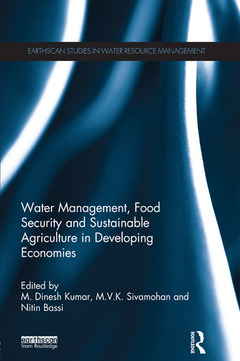Description
Water Management, Food Security and Sustainable Agriculture in Developing Economies
Earthscan Studies in Water Resource Management Series
Coordinators: Kumar M. Dinesh, Sivamohan M.V.K., Bassi Nitin
Language: English
Subjects for Water Management, Food Security and Sustainable...:
Keywords
Water management; Food security; Sustainable agriculture; Irrigation; India; Tamil Nadu; BC Analysis; Groundwater Depletion; IRAP; Mi System; North Gujarat; Agricultural Water Management Interventions; Water Scarce Regions; Microirrigation Systems; Normal Rainfall Years; Hard Rock Areas; Water Abundant Regions; Water Efficient Crops; Treadle Pumps; Water Spread Area; BC Ratio; Real Water Saving; Water Rich Regions; High Valued Cash Crops; IMT; Net Return; Pond Rehabilitation; Western Rajasthan; Agricultural Gdp; Surface Irrigation Systems
Publication date: 05-2015
· 15.6x23.4 cm · Paperback
Publication date: 09-2012
256 p. · 15.6x23.4 cm · Hardback
Description
/li>Contents
/li>Readership
/li>Biography
/li>
This book addresses strategies for food security and sustainable agriculture in developing economies. The book focuses primarily on India, a fast developing economy, whose natural resource base comprising land and water supporting agricultural production is not only under enormous stress, but also complex and not amenable to a uniform strategy. It critically reviews issues which continue to dominate the debate on water management for agricultural and food production.
The book examines the validity of the claim that large water resources projects cause serious social and environmental damages using global and national datasets. The authors examine claims that the future of Indian agriculture is in rain-fed farming supported by small water harvesting. They question whether water-abundant eastern India could become the granary of India, through a groundwater revolution with the right policy inputs. In the process, they look at the less researched aspect of the food security challenge, which is land scarcity in eastern India. The book analyzes the physical, economic and social impacts of large-scale adoption of micro irrigation systems, using a farming system approach for north Gujarat. Through an economic valuation of the multiple use benefits from tank systems in western Orissa, it shows how value of water from large public irrigation systems could be enhanced.
The book also looks at the reasons for the limited success in bringing about the much needed institutional reforms in canal irrigation for securing higher productivity and equity using case studies of Gujarat, Madhya Pradesh and Maharashtra. Finally it addresses how other countries in the developing world, particularly Sub-Saharan Africa could learn from Indian experience.
1. Food Security and Sustainable Agriculture in Developing Economies: The Water Challenge 2. Key Issues in Indian Irrigation3. Food Security Challenges in India: Exploring the Nexus between Water, Land and Agricultural Production 4. Redefining the Objectives and Criteria for Evaluation of Large Storages in Developing Economies 5. Sector Reforms and Efficiency Improvement: Pointers for Canal Irrigation Management 6. Rebuilding Traditional Water Harnessing Systems for Livelihood Enhancement in Arid, Western Rajasthan7. Hydrological and Farming System Impacts of Agricultural Water Management Interventions in North Gujarat, India 8. Technology Choices and Institutions for Improving Economic and Livelihood Benefits from Multiple Uses Tanks in Western Orissa9. Future Strategies for Agricultural Growth in India 10. Investment Strategies and Technology Options for Sustainable Agriculture Development in Asia: Challenges in Emerging Context11. Water Management for Food Security and Sustainable Agriculture: Strategic Lessons for Developing Economies.Index.
M. Dinesh Kumar is Executive Director of the Institute for Resource Analysis and Policy (IRAP), Hyderabad, India.
M.V.K. Sivamohan is Principal Consultant for IRAP, and is based in Hyderabad.
Nitin Bassi is a Senior Researcher with IRAP and is based in Delhi.
Contributors:
A. Narayanamoorthy, V. Niranjan, Ranjan Panda, Zankhana Shah, O. P. Singh, and P. K. Viswanathan.



